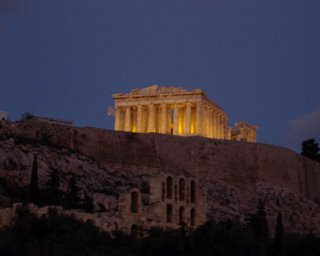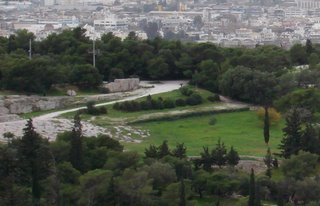 In Greek mythology, there was a major tussle between Athena and Poseidon over the control of Athens. As they postured, Poseidon struck the ground with his trident and off came a spring that gave life water to the city. This was not that impressive, considering he was the God of oceans. Athena did one better and gave the gift of the olive tree to Athens. The Goddess of wisdom (and strategy) won the contest and therefore came to preside over the city of Athens. (The Greek reverence for the olive tree was so grave that in 600 BC, Solon mandated death sentence to anyone found cutting down an olive tree. The tree which has no top roots was planted so widely in the place of forests that it contributed heavily to the utter devastation of ecosystem with topsoil erosion. But now I am digressing.)
In Greek mythology, there was a major tussle between Athena and Poseidon over the control of Athens. As they postured, Poseidon struck the ground with his trident and off came a spring that gave life water to the city. This was not that impressive, considering he was the God of oceans. Athena did one better and gave the gift of the olive tree to Athens. The Goddess of wisdom (and strategy) won the contest and therefore came to preside over the city of Athens. (The Greek reverence for the olive tree was so grave that in 600 BC, Solon mandated death sentence to anyone found cutting down an olive tree. The tree which has no top roots was planted so widely in the place of forests that it contributed heavily to the utter devastation of ecosystem with topsoil erosion. But now I am digressing.)Standing at the temples dedicated to Athena in Acropolis, I only had one thought. What if Poseidon had won? What if the life spring was more valued than the olive tree? I walked around the Acropolis temple complex in total awe of what it took to complete these amazing temples in such a short time. From where I stood, I could see the sloping lawn that served as the spot of the first Parliament of ancient Greece. I wandered aimlessly through the land that gave humanity so much. Down the hill, I paused at the spot where St. Paul preached the gospel to the new converts and where the first high court of ancient Greece had met.

Then a thought struck me; why not go searching for Poseidon?
Impulsive that I am, I wanted to take a route less traveled. The Poseidon temple in Cape Saunion, is about 70 Km away from Athens. I decided to get there by first going to the port city of Piraeus which was the lifeline to the city of Athens. Piraeus has all the charm of a cruise ship town. It is non-descript and busy with a port crammed with a thousand ships of various sizes and flags. I don't speak any Greek and it takes me an hour to read a sign in Greek (all those Physics classes actually helped) so it took me some time to finally understand that the distance between two places is not a straight line. It is often a chevron. I had to go back to Athens. The train station was a smaller model of Victoria Terminus in Bombay and outside I found Bangladeshi men selling trinkets. Across the station, Boston Cafe was serving hot coffee. This was no place for Poseidon, even with all those ships. I had to find my lesser God somewhere else.
Victoria station lies after Omonia. If you get off the line, you can walk to Stadiou Street to catch a public bus to Cape Sounion. No luxury buses for this trip. Pilgrimages are best made with hardship. At one point when I was wandering around lost, a Punjabi shopkeeper happily pointed me in the right direction.
The bus ambled through Athens traffic and went through small towns and suburbs. A peasant woman got in with a plastic bag full of inconsequentials. She was dressed in the traditional grab of a window and had a wonderful toothless smile. Small town squares appeared and disappeared. Once in a while, in the middle of ugly modern construction, a dilapidated Roman villa came into view. Sometimes, the wall of an old house had the distinct look of a Byzantine building.
There were numerous Orthodox churches that were well kept and old priests in cassocks busied themselves around them. Greek government pays the salaries of the Orthdox priests. To the victor go the spoils.
Every turn was a reminder of a battle fought or lost. Every church a memory of what was lost.
Poseidon lost his battles to all of them - To Athena, to Solon. To the Spartans, the Romans, the Byzantines, the Florentines, and the Turks. May be that is why I felt a kinship with him. For all his might guarding the seven seas, he was defeated by the sword and the gunpowder and the firebrand preachings of semitic gods. I thought of Constantin banning the teachings of Plato and Aristotle as they were found to be too corrupting to the Christian mind.
As the light faded and the road winded through interminable hill passes, I looked out the window and sought an idea to seek my redemption with. Perhaps a chant, a prayer, a song. But there was nothing. All I could hear was the silent bearings of aimless travel.
Then, just as dramatic as it sounds, the Aegean Sea appeared before me. Tideless and waveless, its silvery waters began to hug the ragged coastline as the bus continued on the coast. Far ahead in the distance, I could see the temple of Poseidon, majestic and somber, looking out for the sailors over the cliff.
My journey was over. The bus departed to its more ordinary destinations and I climbed silently to the pinnacle to seek my audience with God. Of course, his bronze statue is long gone (now in a museum in Athens) but His presence still remains. On the way back, in the pitch-black darkness of the night, I paused to look at the temple, lit and imposing, from the building below. Around me the Aegean Sea slept silently. I could see the glimmer of small fishing boats like fireflies in the distance. Nothing moved in the bushes and the trees were windless. Except for a stray dog rummaging through a trash can, everything was at peace.
May be Poseidon didn't lose after all. To preside over the tranquil waters of the Aegean Sea from these majestic cliffs is a much better fate than be the overlord of a chaotic and tormented city like Athens. From here, he enjoys the silence and peace with fortitude. Athena may have won the battle, but she certainly lost the war.

I am not sure what would have changed if Poseidon had won. That was the curious question that brought me to the foot of this structure. That question no longer mattered. All that mattered was the peace, tranquility and the silence of this dark spot.
This is the true church. Nature in its true majesty.
If I could, I would have prayed.